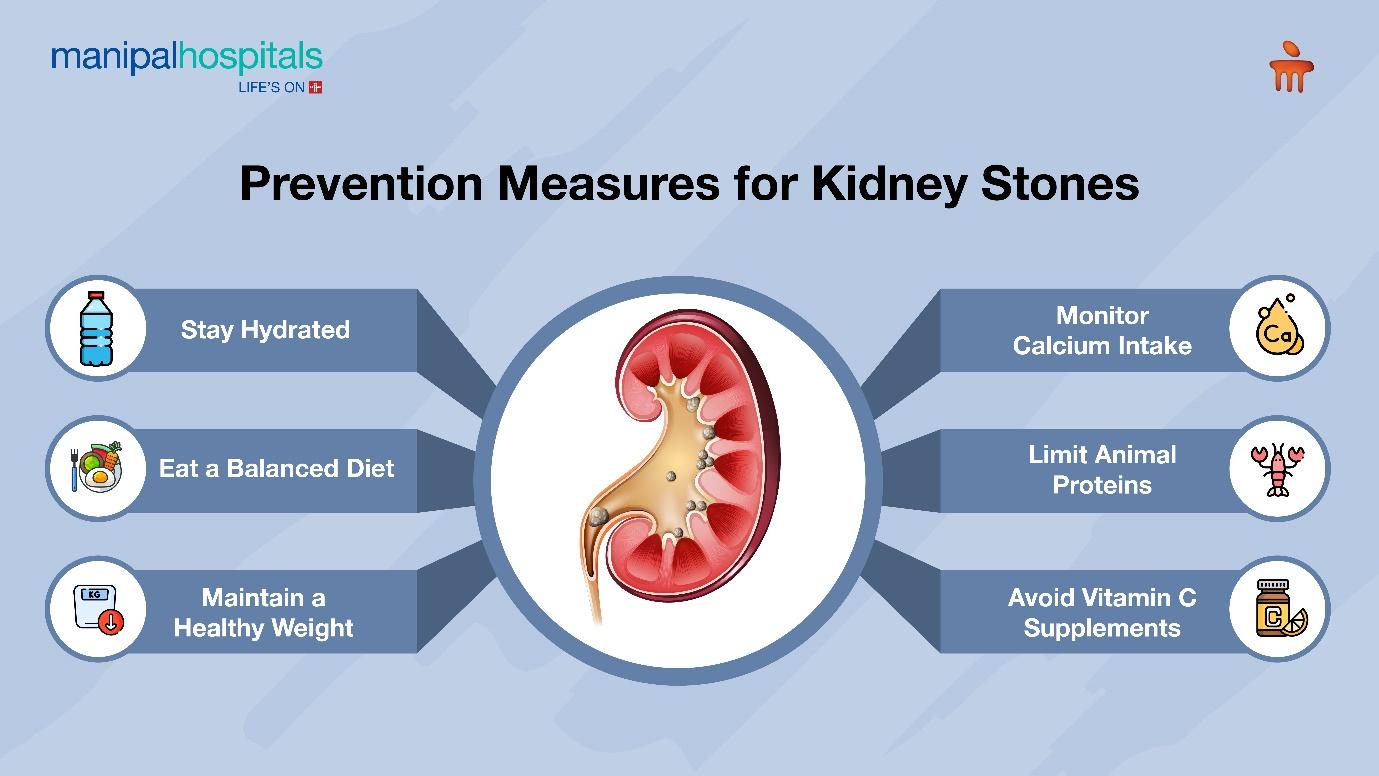
Kidney stones, often called calculi, nephrolithiasis, or urolithiasis in medical terms, are hard deposits made of minerals and other substances in the urinary tract. Most stones pass out on their own with urine, but they can be very painful as they move through the urinary tract. Sometimes, medical procedures are needed to break up or remove the stone from the kidney.
Synopsis
What Are Kidney Stones and How Common Are They?
Kidney stones are solid masses that form when minerals and salts in the urine crystallise and stick together. They can range in size from tiny grains to larger masses that can block the urinary tract. Kidney stones are quite common, affecting about 1 in 10 people at some point in their lives. They are more common in men than in women and often occur between the ages of 30 and 60.
What Are the Causes and Symptoms of Kidney Stones?
Causes
-
Dehydration: One of the most common causes of kidney stones is dehydration. Not drinking enough water can lead to concentrated urine, making it easier for minerals and salts to form stones. Drinking plenty of water is essential for preventing kidney stones. It is recommended to drink at least eight glasses of water each day.
-
Unhealthy Diet: Our diet plays a significant role in the formation of kidney stones. High intake of oxalate-rich foods, such as spinach, chocolates, and nuts can increase the risk. It also contains protein which can contribute to stone formation. Also, consuming too much salt can lead to higher calcium levels in the urine, promoting kidney stones.
-
High Protein Intake: Eating a high diet protein can also cause kidney stones. Animal proteins are rich in purines, substances that metabolise into uric acid in the body. Elevated uric acid levels can result in the formation of uric acid stones. To lower the risk, try to balance your diet with plant-based proteins and limit your intake of red meat.
-
Family History: Genetics can play a part in kidney stone formation. If someone in the family has had kidney stones, it increases the likelihood of developing kidney stones.
-
Excessive weight: Obesity is another risk factor for kidney stones. Being overweight can change the acid levels in urine, leading to stone formation. Maintaining a healthy weight through a balanced diet and regular exercise can help prevent kidney stones.
-
Medical Conditions: Conditions such as hyperparathyroidism, Crohn’s disease, and urinary tract infections can increase the risk and can develop kidney stones.
-
Certain Medications: Certain drugs and medications, contribute to kidney stone formation. Diuretics and calcium-based antacids can raise the risk of stones.

Symptoms
1. Severe Pain: Sharp pain in the back, side, lower abdomen, or groin.
2. Blood in Urine: Pink, red, or brown urine.
3. Frequent Urination: An increased frequency in the urge to urinate.
4. Nausea and Vomiting: Often accompanying severe pain.
5. Fever and Chills: Indicating an infection if present.
Kidney Stone Procedures
When kidney stones cannot pass on their own, medical procedures may be necessary. Some common procedures include:
1. Extracorporeal Shock Wave Lithotripsy (ESWL): Uses sound waves to break the stones into smaller pieces that can be passed in urine.
2. Ureteroscopy: Involves a thin tube inserted through the urethra to locate and remove or break up the stone.
3. Percutaneous Nephrolithotomy: A surgical procedure to remove large stones directly from the kidney through a small incision in the back.
4. Laser Lithotripsy: Uses a laser to break up the stones into smaller fragments that can be passed or removed.
Kidney Stones Prevention
Preventing kidney stones involves some lifestyle changes:
-
Stay Hydrated: Drink ample water throughout the day to maintain dilute urine.
-
Diet for Kidney Stones: Reduce intake of oxalate-rich foods and limit salt and animal protein.
-
Maintain a Healthy Weight: Regular exercise and a balanced diet can help prevent obesity-related stone formation.
-
Monitor Calcium Intake: While calcium is essential, it’s important to consume it in moderation and avoid excessive use of calcium supplements.
-
Limit Animal Proteins: Animal proteins contain purines, which break down into uric acid in the body.
-
Avoid High-Dose Vitamin C: High doses of vitamin C supplements can increase the amount of oxalate in urine.
Kidney stones can be a painful and recurring problem, but understanding their causes and taking preventive measures can significantly reduce the risk. Stay hydrated, watch your diet, maintain a healthy weight, and manage any underlying medical conditions effectively. Regular check-ups with your healthcare provider can help monitor your condition and prevent the formation of new stones. By taking these steps, you can maintain better kidney health and reduce the likelihood of developing kidney stones.
FAQ's
Kidney stones are quite common, affecting around 1 in 10 men at some point in their lives.
The most common symptom of a kidney stone is severe pain in the lower back, side, or groin. Other symptoms can include:
- Blood in the urine
- Pain or burning sensation when urinating
- Needing to urinate frequently but passing small amounts
- Nausea and vomiting
Doctors may use various methods to diagnose kidney stones, including:
- Urinalysis: A test to check for blood or other abnormalities in your urine.
- Blood tests: To check your kidney function and levels of minerals that can form stones.
- Imaging tests: X-rays, CT scans, or ultrasounds to locate the stone.
Yes, there are several types of kidney stones, each composed of different minerals. The most common types are:
- Calcium oxalate stones
- Uric acid stones
- Struvite stones
- Cystine stones





















 3 Min Read
3 Min Read
















